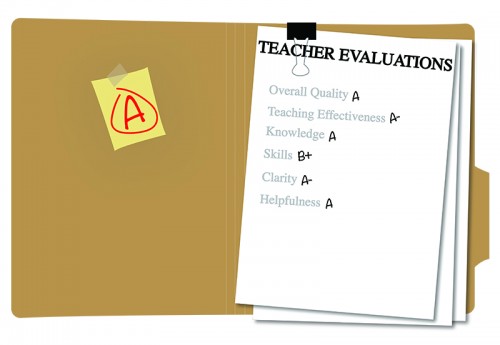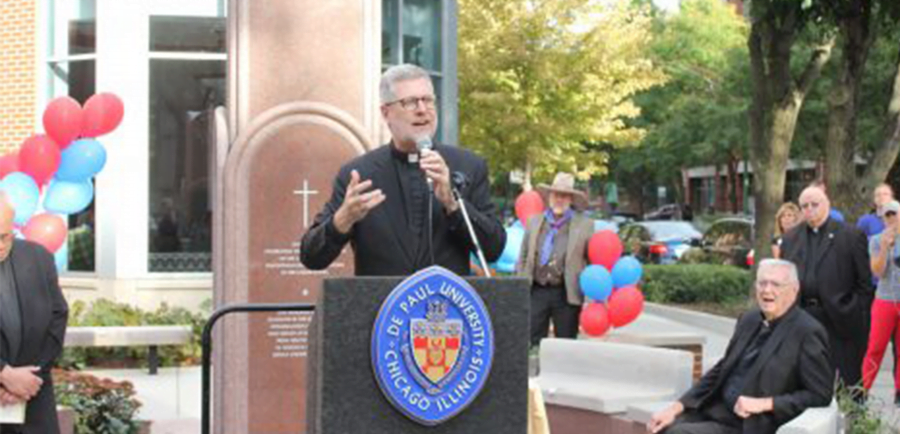
While end-of-the-quarter course evaluations can be viewed as a nuisance by some, they could now mean much more as students in several colleges can now access data from past course evaluations on their Campus Connect accounts while registering for classes.
The feature, which was on the Student Government Association’s wish list for years, is accessible when viewing class descriptions on Campus Connect. It displays the aggregate student response data for five standard university questions related to the overall effectiveness and quality of the course.
However, it is currently only available for courses within the College of Science of Health, School for New Learning, the Driehaus College of Business and the Theatre School. The College of Law and the College of Computing and Digital Media have already had their course evaluations available on their respective websites separate from the SGA initiative.
Notably missing from the aforementioned list are the College of Communication, College of Liberal Arts and Social Sciences, College of Education and the College of Music, none of which have approved the feature at this point.
Inevitably, the tool ends draws comparisons to informal student rating sites proliferated throughout the internet, including the somewhat infamous Rate My Professor. SGA President Vanessa Cadavillo said that the organization hopes that posted course evaluations will prove to be a welcome alternative to Rate My Professor and other similar sites.
“The data we get from these questions are reflective of the progress and the effectiveness of course evaluations,” Cadavillo said. “What makes it different from other forums and platforms is that we know it can measure data and that students are typically given a scale.”
Opponents offer a multitude of reasons why they are uncomfortable with the idea of posting these evaluations for public viewing. Alexandra Murphy, an associate dean in the College of Communication, said that the faculty within the college is “overwhelmingly not in favor” of the feature.
“One of the biggest (reasons) is that we don’t think the evaluations were designed for that kind of public viewing. We look at the evaluations for professional development, and so we would rather that they maintain that kind of sense,” Murphy said. “Students knowing that that information would be public might be more reticent to rank in different ways, or things like that. So we really want to keep the integrity of the evaluations for what we see them as designed for.”
She added that many faculty members would prefer to see comprehensive course syllabi added to the description of each class, although she acknowledged that this may be an imperfect compromise due to the shifting nature of schedules from quarter to quarter. Ultimately, she said, it may be best for students to arrange a meeting or phone call with a professor who teaches the course that they are interested in.
Some colleges, despite having similar reservations, ultimately voted to enact the feature, finding it preferential to other online options unsanctioned by the university. However, many faculty members within these colleges still take issue with the current framework of student evaluations, especially in regards to the inherent biases participants may have toward their professors and classes.
“I think that there are a lot of problems with student evaluations. Research has shown that they are positively correlated with grades, that the personality of the faculty member has a lot to do with the evaluation, things that don’t necessarily deal with teaching effectiveness,” said Ray Whittington, dean of the Driehaus College of Business. “The faculty that are against (the evaluations) really recognize that there are some limitations on the validity of the student evaluations.”
Whether or not these limitations will continue as the evaluations progress in their public state remains to be seen, but Cadavillo said that SGA will be keeping close tabs on student reaction and participation in the evaluations as time progresses.
“Moving forward, we’re really going to be looking at how students respond to this program and how they respond to this tool,” Cadavillo said. “If it’s something that they prefer using over any other source, such as Rate My Professor.”
She also added that SGA plans to maintain a dialogue with the student body both in person and through social media. This, she said, is the most vital tool in testing campus-wide enthusiasm for the feature.
“I think that we won’t be able to gauge how students feel about this tool if we don’t engage in conversation,” Cadavillo said.




Michael Mont • Oct 28, 2015 at 5:10 pm
Hi Emma! Great article, but how do I get to actually check the surveys in campus connect? Is there any way you could include a step-by-step guide on how to get to the student surveys? Transparency is a great thing to have, and I appreciate you letting us know about it.